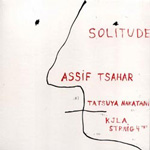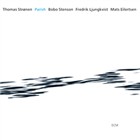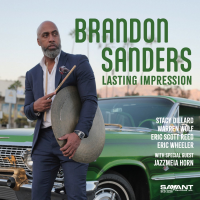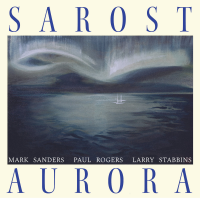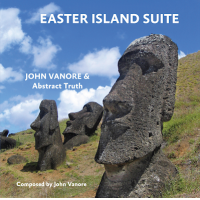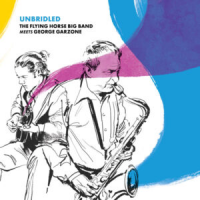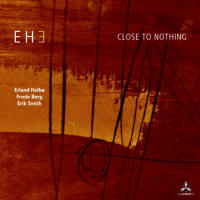Home » Jazz Articles » Multiple Reviews » Paul Motian: ECM Recordings
Paul Motian: ECM Recordings
Performing with a concentrated intensity, usually with very little bass drum, Motian always adds his own personality in a very subtle way, without ever overpowering the "soloists." Even when he keeps time each part of the measure is treated differently, and when the music is freer, Motian creates clouds of sound, adding to the mix, pushing the other members of whatever band in which he finds himself.
The selection below is not meant to be exhaustive but representative of Motian's work on ECM, both as a leader and as a sideman.
 Paul Motian Band
Paul Motian Band Garden Of Eden
ECM 1917
2005
The Garden Of Eden is a return to Motian's Electric Bebop Band with an overall sound and album structure very much like Holiday For Strings (Winter & Winter 910-069), but with one more guitar, making three. The sound produced is one of a diaphanous green mist as everyone seems to play together, but in fragments. The guitar players are very careful to maintain different ranges when they comp, staying out of each other's way. With the electric bass back in the mix, and Motian's sound spread across the stage, the other players are spread out left to right, alternating guitar and saxophone.
The bulk of the tracks (seven) are composed by Motian, with Chris Cheek (sax) and Steve Cardenas (guitar) adding one each, although they sound very much within the Motian bag. Two Mingus tunes and two bop classics surround the ethereal center and the one standard, "Bill," by Jerome Kern interrupts the moody, floating tunes.
The overall feeling produced is one of an intense timelessness, as if one were floating down a tropical river where the silence is deafening yet everything is bursting with life. Time becomes quite relative, and it is easy to get lost and be carried away. Enchanting and enticing!
 Bobo Stenson/Anders Jormin/Paul Motian
Bobo Stenson/Anders Jormin/Paul Motian Goodbye
ECM 1904
2005
Bobo Stenson returns as a leader with Goodbye after the stunning Serenity. The music in Goodbye is a bit less abstract than Serenity, but no less concentrated and intense. The surprise was that Motian replaced Jon Christensen, a long time Stenson playing partner, but does so without creating any waves. Needless to say, Stenson's musical aesthetic fits Motian like a glove. Motian, a master of the cymbals, can color the quiet, introspective sections, always listening to Jormin as in "Alfonsina," play everywhere that is needed and yet be unexpected as in "Music For A While," create an aural aura in "Sudan," provide the appropriately ominous sound for "Queer Street" or cook with his bandmates in Ornette Coleman's "Race Face." Motian does not travel anymore for health reasons, so this version of the Stenson trio will be a local New York City phenomenon or exist purely on record.
 Enrico Rava
Enrico Rava Tati
ECM 1921
2005
No one can be blamed for holding Enrico Rava and Tomsaz Stanko side by side and seeing almost parallel careers, at first marked by total immersion in the free jazz, and then evolving over the years towards a concentrated lyricism which is backed and informed by a total freedom; both play what they want to, not just what they can.
Tati is an album of subtle beauty, which comes foremost from Rava's burnished, soft-edged, yet fully supported sound and his ability to do the unexpected. Bollani has been playing with Rava for quite a while now and has come to be able to anticipate the elder musician's moves, but also to lead Rava to new areas. Add in Motian who is a master of understated accompaniment, yet who always pushes, always comments, and you have an album that just will not devolve into the mere semtimental.
After a wonderful reading of Gershwin's "The Man I Love," Motian's Satie-esque "Birdsong" and a Puccini aria, "E lucevan le stelle," which together might signal a calm and placid superficial beauty to the unsuspecting, comes "Jessica Too" with its jaunty rhythm and surprising dissonances to a powerful reading of Motian's "Fantasm" (from Psalm), and "Cornettology" that is just so quirkishly happy that you just have to smile, maybe especially at Motian's drumming.
No, Rava is not about to fade, but rather is musically wise, as is Motian, who displays all the energy (and then some) of the much younger Bollani, who, however, can easily keep up with such deep musicians. Tati is full of surprises and, along with Easy Living make a pair of accessible records that have much depth.
 Paul Motian/Bill Frisell/Joe Lovano
Paul Motian/Bill Frisell/Joe Lovano I Have The Room Above Her
ECM 1902
2005
I Have The Room Above Her marks the return of Motian's working trio that recorded on JMT (and reissued on Winter & Winter), as well as "It should've happened a long time ago" (ECM, 1985). The sound of something like "Osmosis Part III" and "Sketches" will certainly remind listeners of Garden of Eden, which, while reincarnating an earlier band, only reinforces the musical thinking that is trademark Motian.
Frisell, who also appears on the 1988 The Paul Bley Quartet, is magnificent in playing music, rather than guitar. While "Odd Man Out" might have his most "standard" guitaristic playing, on other tracks, like the two mentioned previously, we see him play a sound machine rather than mere guitar. For those people who only know Lovano as a full-throated player, his contributions here will surprise as he as much more air and tenderly caresses the notes, both in the abstract pieces and standards represented by the Kern/Hammerstein tune "I Have The Room Above Her" and the obscure Thelonious Monk piece "Dreamland." Outside of these two tracks, all the other are by Motian, with "Dance" returning from the 1978 session of the same name.
What is brought forward and emphasized in Garden Of Eden, the floating dreaminess, is more than hinted at here, but not made overt. "Harmony" and "The Riot Act," for instance, while not being screamers, are more aggressive than the earlier cuts, while "One In Three" provides a link to the more ruminating "Dreamland."
 Marilyn Crispell Trio
Marilyn Crispell Trio Storyteller
ECM 1847
2004
Storyteller, ostensibly lead by Crispell, is compositionally Motian's record, as he contributes six of the eleven pieces. While no one can say for sure, the record's overall sound, including those pieces by Crispell herself and the bassist Helias share the same emotional and musical space, colored everywhere by the pedalling of Crispell. The constant overlapping of notes produces a very high shimmer, which is reinforced by Motian's cymbals.
The record opens and closes with Crispell pieces, "Wild Rose," which sounds like a flowing tribute to the site of a blazing rose bush in the wild, and which is over before one realizes it, and "So Far, So Near" in which Helias' powerful playing makes a case for replacing Peacock, until Crispell enters and melts the speakers with pure beauty and poignant emotion, very nearly crying with the keys, as Motian accents and underfills her sound.
The Motian compositions are arranged inside the bookends of Crispell, two up front ("Flight of the Bluejay" and "The Storyteller") and three at the end ("Play," "The Sunflower," "Cosmology 1"), with "Cosmology 2" at the very center of the record. The moods are many and varied, drawing from reactions to the beauty of nature, or its ability to awe us. The title tune features a foreign scale, perhaps from Motian's Armenian past, played against an almost terrifying, veyr insistent drum pattern played on both snare and cymbal. Also venturing into foreign scale is Cosmology 2, which evolves into one long, singing line from Crispell urged on by Motian and Helias, while "Play," although of course sounding nothing like it, might remind one of Debussy's Jeux, even to the point of being able to see a ballet being performed as it almost takes off.
The Helias compositions, while sharing in the same emotional space as those of Crispell and Motian have something more a purer melodic component to them, combined with the controlled power that seems to attract both of the other players. It is a mystery why this is his only record for ECM, because he has a rather large discography.
Storyteller can very easily sweep one away, up into its soaring heights of pure sound, sound which is nevertheless always anchored by rigorous intellectual muscle, and which is never maudlin.
Marilyn Crispell/Gary Peacock/Paul Motian
Amaryllis
ECM 1742
2001
Nothing Ever Was Anyway (1997, see below) was universally hailed as one of very best records in the ECM catalogue, and then Amaryllis comes along and threatens to dislodge it. One reason for this is that this record contains music written by the trio rather than by another, albeit a superb, composer—Annette Peacock. A second is that this Marilyn Crispell, this romantic, flowing, singing Marilyn Crispell is now understood and accepted unreservedly. Her touch, her pedalling, taken aside from what she plays, bespeaks the classically trained pianist she is. But for the third, and most important, reason, Crispell can speak for herself, from the liner notes:
...But for me, the revelation of the session came when Manfred suggested that we play some slow free pieces. What emerged was, possibly, some of the most beautiful music on this album. These pieces, now entitled Amaryllis, Voices, M.E. and Avatar, were not "composed," but sound as though they were. There's a great depth of communication, a rare delicacy. It's a very "inner space."
The revelation of this music somehow was that freedom is not a concept that can be reserved for any one particular style of improvised music. For me, it is both an extension of the past and a new beginning.
The revelation of this music somehow was that freedom is not a concept that can be reserved for any one particular style of improvised music. For me, it is both an extension of the past and a new beginning.
In the second paragraph, Crispell is talking about her performance history as someone in "Cecil Taylor" free jazz mold, breathing fire technically and emotionally. The other side of Crispell that was exposed in Nothing is fully fleshed out here.
Peacock, as he always seems to be, is extremely powerful, and uses his almost patented technique of maintaining two voices, one being mostly a pedal point to great effect. Two of his compositions, though, "Requiem" and "December Greenwings," have a distinctly lighter, almost playful feel that jars a bit with their surroundings.
The trio brings Motian's "Conception Vessel" (from his 1973 ECM debut album of the same name) back, and a comparison between Crispell and Jarrett can be rewarding. Motian's treatment of rhythm is rather clear here. The unit of time is very small and not grouped, hence there is no accent to produce a pulse most of the time. The lack of grouping means there can be no syncopation because there is no expectation. In between the times when this is clear, he blurs the placement of the rhythmic unit, allowing Crispell and Peacock to play a straight without sounding like it, and to rubato without it being obvious. The result is a floating feeling, that nevertheless is anchored, or better, teathered, that nevertheless feels firm.
Marvelous, stunning and totally engrossing, Amaryllis will reveal endless layers of many plays.
 Paul Bley/Gary Peacock/Paul Motian
Paul Bley/Gary Peacock/Paul Motian Not Two, Not One
ECM 1670
1999
With an instrument lineup like the Crispell/Motian trios Not Two, Not One, nevertheless sounds entirely different. This trio has not recorded together in thirty-five years, although they have played as duos, and was brought together again by Peacock. Compositionally dominated by Bley and Peacock, Motian does not contribute anything independently composed by him. The record is set up to present different combinations of the trio, mostly in twos or solo, sometimes for the whole piece, and other times in sections. All three players can be quite intense, particularly Peacock, but they rarely reach the same pitch simultaneously.
"Not Zero: In three Parts" opens with solo Bley, sometimes plucking the strings before he descends into the deepest notes on the piano that sounds like water, not a vibrating string. After implying many different rhythms and moods, Motian plays solo (Part Two) for a short time before Peacock's almost brutal, forceful bass sound takes over, eventually setting up a pulsing rhythm under which Motian supports, and to which Bley gradually adds notes so low they become percussive, ultimately creating an amazing sound and a super track.
"Entelechy," "Intente" and "Set Up Set"are all written by Peacock. The first is a pure solo work where Peacock manages to accompany himself by playing in alternating registers, while the second features Peacock playing against a backdrop of sound produced by the cymbals and snare of Motian, with Bley entering about half-way through answering Peacock's phrases, the trio producing a very free, yet concentrated sound that is the trademark of the album. "Set Up Set" uses very simple materials that get worked and reworked, always moving and pushing forward.
Bley's contributions include the bluesy "Fig Foot," which provides a nice change of pace for all three men. This is surrounded by the Bley solo pieces of "Now," which never stops moving with either the left or right hand taking the lead, along with some faint vocalisms, and "Vocal Tracked," where Bley does make the piano sing through its many moods.
The other tracks on this record add to the feelings of an intensity tempered by the joy of spontaneous music creation. Clearly relishing the chance to record together again, Bley, Peacock and Motian have made the most of it, and thus, they are "Not Two, Not One," but three.
 Marilyn Crispell/Gary Peacock/Paul Motian/Annette Peacock
Marilyn Crispell/Gary Peacock/Paul Motian/Annette Peacock Nothing Ever Was Anyway. The Music Of Annette Peacock
ECM 1626/27
1997
Nothing Ever Was Anyway. The Music Of Annette Peacock is another high point in the ECM catalogue. The main trio (Peacock sings on just one track) subsequently recorded Amaryllis, perhaps based on the reaction to this masterpiece. Starting with Annette Peacock's very deep and unpredictable music, Crispell (piano), Peacock (bass) and Motian (drums) have created a double CD of stark concentration and enormous musical power, using very few notes in the process.
Extremely well recorded, Annette Peacock's musical style comes to life through all of the large intervallic jumps, the sudden twists of harmony, the extreme pathos and vulnerability. Crispell takes her time and builds through each track, while Gary Peacock and Motian give powerful support, not so much through rhythm, but by refracting the music's emotions through their own instruments. "Touching," at the center of the extended set, was also recorded and placed first by Kornstad and Wiik on their wonderful Eight Tunes We Like. This tune, made up of simple materials—a triad here, a scale fragment there, but has great beauty and the power to surprise no matter how many times it is heard.
You can hear Annette Peacock's music direct from the artist on An Acrobat's Heart, and hear for yourself how well this great trio translated her idiosyncratic music through their own beings.
 The Paul Bley Quartet with John Surman/Bill Frisell/Paul Motian
The Paul Bley Quartet with John Surman/Bill Frisell/Paul Motian The Paul Bley Quartet
ECM 1365
1988
The Paul Bley Quartet is dominated by the twenty-minute track "Interplay." which starts off sounding a bit like warped Bill Evans with just Motian providing a subtle driving pulse. Soon though Surman enters on soprano sax and the music begins its trip as Frisell plays "sounds" on the guitar (rather than just playing the guitar). The track is sectional but each part merges imperceptibly into the next, becoming one organic whole, with each player coming to fore, but always shadowed by one of the other players. As a bass-less quartet, this could not sound more different than Fieldwork's Simulated Progress in that there is no attempt to fill in the bottom by Bley. The music feels tonal or at least center on a note, and the sounds created must be heard to be understood.
Motian's sole composition "One In Four" fits the established mood but emphasizes, not surprisingly, the rhythmic, with a section that has a triple feel pulling against another section with a duple feel. Physically beautiful music that might be called quintissential ECM, The Paul Bley Quartet is a fine introduction to the individual styles of each of the four players.
 Paul Motian and others
Paul Motian and others :rarum XVI
rarumECM 8016
2004 (recording from 1972-1987)
The :rarum series to do two things simultaneously: to allow an artist with a long history with ECM to decide on a set of tracks that best represents their work and to provide an introduction to the label for those new to it.
Of the nine tracks on this collection, all but three come from albums listed here. Le Voyage ("Folk Song For Rosie" and "Abacus") is not available in the U.S. and "It should've happened a long time ago" is from the album of the same name. Otherwise, two tracks are from Psalm ("Mandeville" and "Fantasm"), two are from Dance ("Asia" and "Dance") and one each from The Paul Bley Quartet ("One In Four"—the only tune composed by Motian on the album) and Conception Vessel ("Conception Vessel").
 The Paul Motian Band
The Paul Motian Band Psalm
ECM 1222
1982
Psalm feels a bit like a fleshed out version of the trio from I Have The Room Above Her, with a bottom supplied by Ed Schuller (bass) and something from The Electric Bebop Band with Billy Drewes adding a second saxophone. The title tune has Frisell sounding like the three guitars in Garden Of Eden all by himself as the saxophones float within his cloud of sound above an arco bass, a prayer in sound.
"White Magic" could not more different, with almost straight rock drumming from Motian, which is jarring, and playing from Frisell that could be very advanced rock and a simple, repeated harmonic bass riff.
Motian returns to his floating, restrained emotionality with "Fantasm," which makes a reappearance on Enrico Rava's Tati. A center section is dominated by an arhythmic bass solo accompanied by rattles and percussion that float across the soundstage. Frisell takes over with his trademark anti-guitar playing, leading to the two saxophones winding around him. All is night and fog, shadows and reflections. "Mandeville," which along with "Fantasm" is on :rarum does a complete mood change, dropping into a very relaxed Caribbean rhythm and a simply constructed melody and harmony.
"Etude" is usually meant as a study of some technical musical problem (as, for example in Chopin) and here Frisell presents a master class of sound, stringing out a simple theme, totally unaccompanied, while "Yahallah" seems to be the closing cover of the vaguely religious mood that opens the record.
Psalm is a mostly quite delicate and deeply moody record, full of beauty and awe, and while there are the occasional quite different tracks, the somberness and spiritual feeling of thankfulness pervades it.
 The Paul Motian Trio
The Paul Motian Trio Dance
ECM 1108
1978
The music on Dance might initially seem anything but that which might evoke dancing of the rhythmic kind. "Waltz Song" does not have any perceptible connection to the 3/4 dance, while the title tune, which might be visualizable in an avant-garde ballet, does not feel like a "dance." "Kalyso" sounds more of march rhythms than Calypso rhythms, and "Asia" does not evoke the Orient in any obvious way.
Nevertheless, there is a bouncing lightness in the music, led by Brackeen's extremely pure soprano saxophone. Brackeen's one track playing tenor, "Prelude" is played in its high register. Some of Motian's most attractive melodies/motives can be heard here. On "Asia," Brackeen floats like a butterfly or a cloud wisp as the melody, with its clear structure plays out against light arco bass and percussion. "Waltz Song" finds Brackeen declaming and then working the unfurling theme in rubato time, against a light, but steady rhythm set up by Motian and Izenzon, creating an intriguing tension. The last tune, "Lullaby" sounds faintly like "Dance" at times and the gongs, soft plucking and arco of the bass do manage to instill a sense of peace.
The music on Dance is quite subtle and never attempts at overpowering the listener, but rather wraps her in a delicate web of sound and evoked images.
 Paul Motian with Keith Jarrett/Charlie Haden/Leroy Jenkins/Sam Brown/Becky Friend
Paul Motian with Keith Jarrett/Charlie Haden/Leroy Jenkins/Sam Brown/Becky Friend Conception Vessel
ECM 1028
1973
Conception Vessel was Motian's first record for ECM as a leader, and is quite eclectic in musical style. Keith Jarrett, who brought Motian to the attention of ECM plays piano on the title track and flute (!) on "American Indian: Song of Sitting Bull." The former is very intense duet featuring music that sounds almost atonal over a two-note alternating bass line. Complete with Jarrett vocalisms (expressions of wonder at what is being created?), Motian matches and underlines everything that Jarrett does, rising and falling, getting denser and pulling back as the music ebbs and flows; quite an amazing track! Jarrett's flute on "Sitting Bull," along with Motian's percussion effects does evoke the American Indian West.
Starting the record is the unexpected and strangely named "Georgian Bay" that is full of Brown's acoustic Spanish guitar playing against some very strong and deep bass of Haden, while a totally different side of Brown is heard on "Rebica," the longest track, which is freer and electric "Ch'i Energy is a drum/percussion solo that includes huge splash cymbals and gongs that sound like water and which never settles down into anything predictable.
Conception Vessel is very far removed from say, Garden Of Eden in its overall sound, as one would expect from a career that spans thirty years on ECM. However, the restless energy and curious spirit, always ready to expand and follow the muse can be easily heard here as well.
Tracks and Personnel
Garden Of Eden
Tracks: Pithecanthropus Erectus; Goodbye Pork Pie Hat; Etude; Mesmer; Mumbo Jumbo; Desert Dream; Balata; Bill; Endless; Prelude 2 Narcissus; Garden of Eden; Manhattan Melodrama; Evidence; Cheryl
Personnel: Chris Cheek: saxophones; Tony Malaby: saxophones; Jakob Bro: guitar; Ben Monder: guitar; Steve Cardenas: guitar; Jerome Harris: electric bass; Paul Motian: drums
Goodbye
Tracks: Send In The Clowns; Rowan; Alfonsina; There Comes A Time; Song About Earth; Seli; Goodbye; Music For A While; Allegretto Rubato; Jack Of Clubs; Sudan; Queer Street; Triple Play; Race Face
Personnel: Bobo Stenson: piano; Anders Jormin: double-bass; Paul Motian: drums
Tati
Tracks: The Man I Love; Birdsong; Tati; Casa di bambola; E lucevan le stelle; Mirrors; Jessica Too; Golden Eyes; Fantasm; Cornettology; Overboard; Gang of 5
Personnel: Enrico Rava: trumpet; Stefano Bollani: piano; Paul Motian: drums
I Have The Room Above Her
Tracks: Osmosis Part III; Sketches; Odd Man Out; Shadows; I Have The Room Above Her; Osmosis Part I; Dance; Harmony; The Riot Act; The Bag Man; One In Three; Dreamland
Personnel: Joe Lovano: tenor saxophone; Bill Frisell: guitar; Paul Motian: drums
Storyteller
Tracks: Wild Rose; Flight of the Bluejay; The Storyteller; Alone; Harmonic Line; Cosmology; Limbo; Play; The Sunflower; So Far, So Near
Personnel: Marilyn Crispell: piano; Mark Helias: double-bass; Paul Motian: drums
Amaryllis
Tracks: Voice from the Past; Amaryllis; Requiem; Conception Vessel/Circle Dance; Voices; December Greenwings; Silence (for P.); M. E. (for Manfred Eicher); Rounds; Avatar; Morpion; Prayer
Personnel: Marilyn Crispell: piano; Gary Peacock: double bass; Paul Motian: drums
Not Two, Not One
Tracks: Not Zero: In Three Parts; Entelechy; Now; Fig Foot; Vocal Tracked; Intente; Noosphere; Set Up Set; Dialogue Amour; Don't You Know; Not Zero: In One Part
Personnel: Paul Bley: piano; Gary Peacock: double-bass; Paul Motian: drums
Nothing Ever Was Anyway. The Music Of Annette Peacock
Tracks: Disc 1: nothing ever was, anyway; Butterflies that I feel inside me; open, to love; cartoon; Albert's Love Theme; Dreams (If time weren't); Disc 2: touching; Both; You've left me; Miracles; Ending; Blood; nothing ever was, anyway
Personnel: Marilyn Crispell: piano; Gary Peacock: double bass; Paul Motian: drums
The Paul Bley Quartet
Tracks: Interplay; Heat; After Dark; One In Four; Triste
Personnel: Paul Bley: piano; John Surman: soprano saxophone, bass clarinet; Bill Frisell: guitar; Paul Motian: drums
:rarum XVI
Tracks: One In Four; Conception Vessel; Dance; Asia; Folk Song For Rosie; Abacus; It should've happened a long time ago; Fantasm; Mandeville
Personnel: Paul Motian: drums, percussion; Paul Bley: piano; John Surman: soprano saxophone; Bill Frisell: guitar; Keith Jarrett: piano; Charles Brackeen: tenor and soprano saxophones; David Izenzon: double-bass; J.F. Jenny-Clark: double-bass; Joe Lovano: tenor saxophone; Billy Drewes: alto saxophone; Ed Schuller: double-bass
Psalm
Tracks: Psalm; White Magic; Boomerang; Fantasm; Mandeville; Second Hand; Etude; Yahllah
Personnel: Paul Motian: drums; Bill Frisell: guitar; Ed Schuller: bass; Joe Lovano: tenor saxophone; Billy Drewes: tenor and alto saxophone
Dance
Tracks: Waltz Song; Dance; Kalypso; Asia; Prelude; Lullaby
Personnel: Paul Motian: drums; David Izenzon: bass; Charles Brackeen: soprano and tenor saxophones
Conception Vessel
Tracks: Georgian Bay; Ch'I Energy; Rebica; Conception Vessel; American Indian: Song Of Sitting Bull; Inspiration From A Vietnamese Lullaby
Personnel: Paul Motian: percussion; Charlie Hayden: bass; Sam Brown: guitar; Keith Jarrett: piano, flute; Leroy Jenkins: violin; Becky Friend: flute
Tags
PREVIOUS / NEXT
Support All About Jazz
 All About Jazz has been a pillar of jazz since 1995, championing it as an art form and, more importantly, supporting the musicians who make it. Our enduring commitment has made "AAJ" one of the most culturally important websites of its kind, read by hundreds of thousands of fans, musicians and industry figures every month.
All About Jazz has been a pillar of jazz since 1995, championing it as an art form and, more importantly, supporting the musicians who make it. Our enduring commitment has made "AAJ" one of the most culturally important websites of its kind, read by hundreds of thousands of fans, musicians and industry figures every month.



